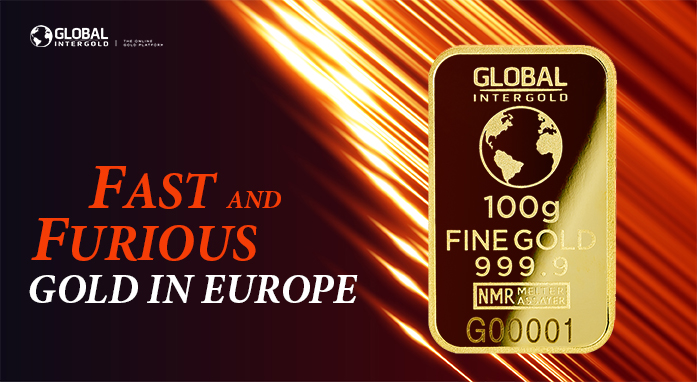Gold in Europe — fast and furious

Europe has become known as the biggest source of risk for the global market. "The European economy is slowing down much faster than many people think," says Mohamed El-Erian, chief economic consultant for Germany's largest insurance company Allianz SE. What processes in Europe are of concern to financial experts?
Five problems of Europe
1. Decline in production
According to Bloomberg, the industrial production in the eurozone* is experiencing the most rapid decline in the last 10 years mainly due to the ongoing trade wars and a declining mass demand for European products.

In the chart: as of 2018, the eurozone industrial production fell by 4,2%.
2. Relations with Russia and the USA
According to the UN estimates, the sanctions standoff with Russia costs the EU more than 100 billion dollars. The crisis has also become apparent in Europe’s relations with its long-time ally, the United States. The protectionist* policy of the United States threatens trade partnership with Europe.
3. Internal disagreements
The lack of consensus on migration issues and the UK’s forthcoming withdrawal from the EU are factors that undermine cohesion and stability in Europe.
4. Population aging
According to the statistics by Eurostat, 24% of Europeans will be over 65 years old by 2030. Population aging entails labor shortage and a greater burden on the state budget. It is predicted that by 2070, European countries' budgetary spending on the elderly will increase by 26,7%.
5. Lagging behind competitors
There are many world-class companies in Europe, but 25 years have passed, and still no company of such a level has been established. Today, giant corporations similar to Amazon, Google or Facebook are not based in Europe. Europe lags behind the US and China in the development of new technologies.
All of the above-mentioned problems weaken the eurozone economy while strengthening gold against the euro.
The price of the yellow metal in the European currency is steadily increasing — over the last year, it has increased by 6%.
Three European countries at risk
Italy
The country’s government debt has reached 2 trillion euros, thereby posing a risk of a large-scale financial crisis. The Italian economy plunges into a recession*, the banking sector is at risk. Italy is among the three largest economies in the eurozone, so the crisis in this country will adversely affect Europe on the whole.

In the chart: Italian GDP* has dropped.
Germany
Last year, the growth of the German economy was 1,5% — the lowest rate since 2013. The reason for it was the automotive industry slowdown and the decline in exports. According to the IMF* forecasts, the German economy will continue to decelerate.

In the chart: a sharp decline in the number of industry orders in Germany.
Great Britain
The uncertainty with Brexit* remains the main cause of financial losses in the UK. The people have spoken, and the referendum regarding the country’s withdrawal from the EU was held on June 23, 2016. Since then, according to S&P Global Ratings, the British economy has been losing 6,6 billion pounds every three months.

In the chart: last year, the UK economy demonstrated the slowest growth since 2012.
What does this mean for gold?
When the global economic tension grows, gold strengthens its positions. We have recently witnessed how the price of gold soared amid the trade standoff between the United States and Mexico. If the situation in Europe gets worse, the demand for gold may increase considerably.
On June 6, 2019, the European Central Bank lowered its economic growth forecast for 2020–2021. Shortly afterwards, the price of gold sharply increased.
On June 17, 2019, the price of gold was $1,340 per ounce.
There are many economic risks and problems in Europe that won’t be easily circumvented in the coming decades. Negative phenomena can seriously affect the state of the global economy. In conditions of uncertainty, gold becomes a sought-after asset that protects savings, guaranteeing Financial Security.
Glossary:
*Eurozone — a monetary union established within the European Union that adopted the euro as the common currency and sole legal tender.
*Protectionism — the economic policy of the state aimed to protect a country’s domestic market by restricting imports through methods such as tariffs on imported goods.
*Recession (Latin: "recessus" – recess) — a general decline in economic activity or an uncritical decline of manufacturing, which is characterized by the lack of growth or a decrease in gross national product.
*GDP (Gross Domestic Product) — an economic indicator showing the total value of all goods and services produced in a country.
*IMF (International Monetary Fund) — a specialized agency of the United Nations that monitors the stability of the global financial system and provides loans to countries.
*Brexit — the withdrawal of the United Kingdom from the European Union.


![[VIDEO] Young investors choose gold
[VIDEO] Young investors choose gold](https://f01.gig-os.com/74/2c/cc/2b/74/742ccc2b74d465054d6aed797b9de6a1_5.jpg?1)
![[VIDEO] The US legalizes payments in gold [VIDEO] The US legalizes payments in gold](https://f01.gig-os.com/cf/b1/ba/70/55/cfb1ba7055dd2524218f5aabd01efea8_5.webp?1)
![[VIDEO] Record gold demand: market situation in Q1 2025
[VIDEO] Record gold demand: market situation in Q1 2025](https://f01.gig-os.com/0d/85/47/0b/15/0d85470b15a79bc2aabf122c0d401060_5.webp?1)
![[VIDEO] Investors in Asia are buying up gold!
[VIDEO] Investors in Asia are buying up gold!](https://f01.gig-os.com/45/45/84/6f/73/4545846f738945417567ffd2f6f163bb_5.webp?1)
![[VIDEO] Gold price has increased 9 times since the early 2000s!
[VIDEO] Gold price has increased 9 times since the early 2000s!](https://f01.gig-os.com/47/af/07/eb/bb/47af07ebbb01542f14c0aae36a81f1c0_5.webp?1)
![[VIDEO] The US is urgently increasing gold mining — what’s going on? [VIDEO] The US is urgently increasing gold mining — what’s going on?](https://f01.gig-os.com/43/06/89/4d/da/4306894dda97c98b6e595409af58b694_5.webp?1)
![[VIDEO] China sets trends in the global gold market
[VIDEO] China sets trends in the global gold market](https://f01.gig-os.com/5b/81/78/92/92/5b81789292d5e49f20ca7ca093a27cbe_5.jpg?1)
![[VIDEO] Central banks acquired a quarter of the world's gold!
[VIDEO] Central banks acquired a quarter of the world's gold!](https://f01.gig-os.com/81/2d/76/ff/b0/812d76ffb00ee75856059a67a872642c_5.webp?1)
![[VIDEO] Gold: new records amid market volatility
[VIDEO] Gold: new records amid market volatility](https://f01.gig-os.com/03/8b/98/61/b7/038b9861b74be1ae5d57e56e2d2dc859_5.webp?1)